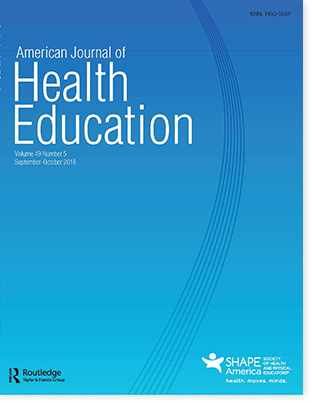 AJHE Table of Contents
AJHE Table of Contents
Assessing Elementary Health Education: Instrument Development for School District Readiness and Delivery
Sarah E. Toth, Marcia R. O'Neal, & Retta R. Evans
 Health Education is the sequence of intentional learning experiences designed for improving individual and community health through improved knowledge and attitudes. Research indicates that Health Education can reduce the prevalence of health risk behaviors related to chronic disease. Specifically, health behaviors such as nutrition, physical activity, tobacco prevention, and other lifestyle choices that reduce chronic disease risk in adulthood are positively impacted by Health Education during childhood. Access to elementary Health Education is a powerful venue for bettering the health of children. Health Education strongly influences health promotion and the prevention of chronic disease in students. Ultimately, Health Education and health behavior can increase years of healthy life and quality of life while breaking the cycle of poverty.
Health Education is the sequence of intentional learning experiences designed for improving individual and community health through improved knowledge and attitudes. Research indicates that Health Education can reduce the prevalence of health risk behaviors related to chronic disease. Specifically, health behaviors such as nutrition, physical activity, tobacco prevention, and other lifestyle choices that reduce chronic disease risk in adulthood are positively impacted by Health Education during childhood. Access to elementary Health Education is a powerful venue for bettering the health of children. Health Education strongly influences health promotion and the prevention of chronic disease in students. Ultimately, Health Education and health behavior can increase years of healthy life and quality of life while breaking the cycle of poverty.
An increase in the delivery of elementary Health Education (EHE) is an objective of Healthy People 2020. Although the majority of states mandate EHE, only approximately 37% of school districts report specific time allotments for the subject. Political pressures, district and superintendent agendas, policy gaps, and standards and accountability issues are pivotal in the wide variation of quality and frequency of EHE delivery.
Even though elementary schools may be required to include Health Education, accountability is lacking. The amount of time and number of days on which EHE is provided differs according to district and state. This leads to wide variation in the quality and frequency of health instruction. In Alabama, Health Education provided by teachers certified in elementary education is required in kindergarten through eighth grade. Additionally, Alabama guidelines suggest that there should be 60 minutes of health instruction per week separate from physical education. Because the State Department of Education in Alabama is not a regulatory agency, health is only included on compliance reviews as it relates to the school nurse.
To read the rest of this article, click here to download a pdf.